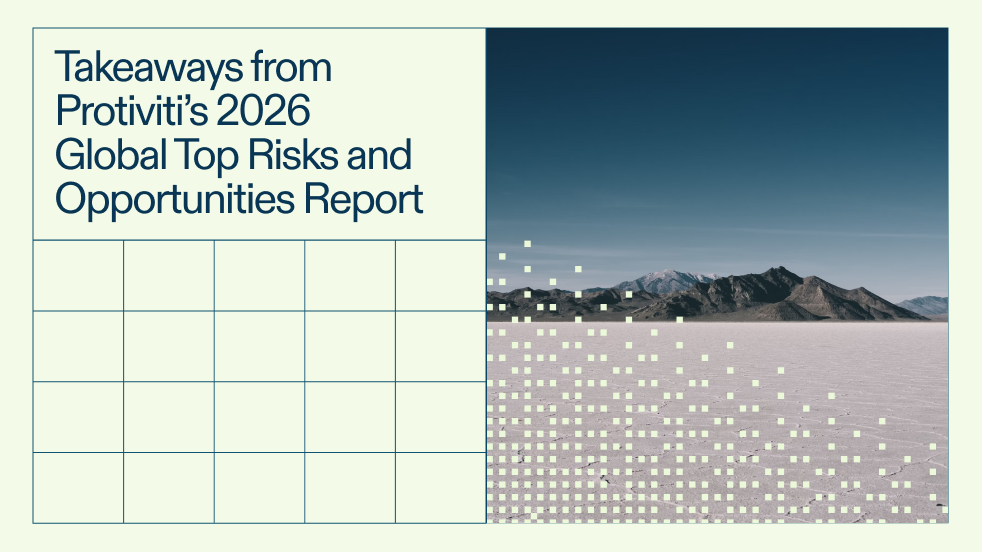
December 19, 2024 • 6 min read
Richard Chambers Advocates for Risk Management Collaboration in a Changing World
Join Richard Chambers for a new episode of his Agents of Change video series, featuring conversations with internal audit leaders from some of the world’s most prominent organizations about innovation in the profession.
In this special edition of Agents of Change, Richard flips the script and takes the hot seat as the interviewee! AuditBoard’s Senior Manager of Digital Media, Myron Kim, steps out from behind the camera to ask Richard why it’s more critical now than ever for all the stakeholders involved in the management of risk to tear down the walls that divide them and collaborate. Richard also shares his perspective on:
- Career advice for internal auditors to “write your own story”
- Reflecting on the challenge for change agents to ”find your voice, even if it’s shaking inside” when speaking truth to power
- How internal auditors can avoid getting replaced by AI as assurance providers
Watch the full conversation, and read the can’t-miss highlights below.
Check out more audit leader interviews with Richard Chambers on our Agents of Change video series channel.
Career Development Advice: Take Personal Agency
Myron Kim: I’m Myron Kim, the Senior Manager of Digital Media at AuditBoard. Thank you for watching a very special edition of Agents of Change, with someone who needs no introduction — in fact, he’s usually the host of the show! It’s the ultimate change agent himself, Richard Chambers: a world-renowned speaker, bestselling author, and one of the most influential thought leaders in the risk and audit space. He’s the former CEO of The IIA and he’s currently serving as the Senior Advisor of Risk and Audit at AuditBoard. Thank you for joining us on your show.
“Richard Chambers: Thank you, Myron. I think our audience should know you’re the brains behind this operation, so you’re normally on the other side of the camera helping me to look good. So, it’s really great to be able to sit down and talk to you face to face.”
Myron Kim: Oh, thank you for that! We’ve done close to 35 episodes together. Does it feel weird being on the other side of the questions for a change?
“Richard Chambers: No, because I love to talk! I mean, when I am hosting it, I don’t get to talk as much, so this is great.”
Myron Kim: You’ve made many stops throughout your career — you’ve worked literally all over the world, have been the Deputy Inspector General of the Post Office, and you’re currently the overseas Dean of Nanjing Audit University. Is there any career advice that you’d be able to give to our listeners? What’s the secret to your success?
“Richard Chambers: I speak to a lot of college students and they’re hungry for career advice, but I would give this advice to people no matter where they are in their career: Write your own story. Don’t let somebody else tell you what you need to do in order to be successful. Because if you look at my career, I started out at 21 years old, grabbed my briefcase, and went off to an internal audit department. Everybody told me I was never going to get into public accounting if I didn’t do it then. Well, I didn’t want to do public accounting then. I had my accounting degree, but I wanted to go and do something that interested me. In some ways, they could have been right. That could have been the end. But guess what? All those years later when I turned 50, I put on a backpack and went to PricewaterhouseCoopers.”
Myron Kim: So, I was in the room with you when you were speaking to the National Honor Society of Accounting Majors, and you shared a little bit of your background about, as you said, “writing your own story.” Did you have a plan in mind in terms of where you wanted to be? Or did these stops just kind of happen just from doing a great job?
“Richard Chambers: I think careers can be over-engineered. If you’re over-engineering your career and you’re saying, here’s where I want to be when I’m 30, here’s where I want to be when I’m 40, you’re simply setting yourself up for unnecessary pressure. You’re setting yourself up potentially to see yourself as a failure. I think what you should be focused on is the process.”
Embrace Change — or Get Run Over By It
Myron Kim: That mindset is probably one of the reasons why you were able to do so much. That’s really amazing. Over the last four years, the world has gone through a lot of change — something that you call permacrisis in the midst of all this. Do you think it’s easier or harder to be a change agent? And in the context of all this global instability, do you think that auditors have a larger platform than before?
“Richard Chambers: I don’t know if I could say it’s easier or harder. It’s probably harder in some ways, but I would say this: It’s more critical to be a change agent today than it was four years ago because of the change happening — and if you’re not part of it, it’s going to run over you. So you can either be driving the change or you can be standing in the way of it. My advice to anybody out there is embrace the environment we live in. Embrace the uncertainty, the volatility, the chaos, and celebrate what can be achieved. That’s where true agents of change, I think, really come of life. They come to life in this kind of environment.”
How Internal Auditors Can Avoid Getting Replaced by AI as Assurance Providers — Distinguish Ourselves
Myron Kim: Speaking of change, we are in a bit of an AI revolution. You actually, of course, share with me quite a bit about how you use AI. It’s crazy how far we’ve come and also a little bit scary to see where we could be going. I wanted to ask you, what are your thoughts on how AI will affect the audit, risk, and compliance professions?
“Richard Chambers: Yeah. I’m a little worried about the reluctance of a lot of people in our profession to embrace the opportunities AI presents. I don’t know that it’s reluctance or being slower to recognize what the opportunities are — as well as the potential threats all of this new technology presents. I don’t know how long it’ll take, but I believe that a day will come when AI will be able to provide all of the assurance that an organization needs. If that’s all we do, we’re going to be in harm’s way.”
The Role of Emotional Intelligence (EQ) in Auditing
Myron Kim: Right, and there’s a human element, I think, that obviously AI can’t provide. In one video we worked on together, I recall you mentioning how EQ is so much more important than IQ. So there’s that human element to everything that is hopefully what’s going to differentiate people in whatever professional field they’re in.
“Richard Chambers: Yeah. I’ve said that the smartest person in the room may not necessarily be the best auditor. Right? Because I think the best internal auditor brings a lot of skills besides intellect. The smart auditor isn’t necessarily going to be the one who can build and sustain the relationships, who can get inside of people’s heads, who can demonstrate the empathy. EQ, or emotional quotient, that emotional intelligence is so important for our profession.”
Myron Kim: There’s this quote that always stuck out to me from when you were interviewing Cynthia Cooper: “Find your voice, even if it’s shaking inside.” It comes from one of your books. When it comes to being a change agent, how essential is it to be open and honest in the face of conflict?
“Richard Chambers: I think to be a change agent, you’ve got to have a lot of inner confidence. But on the other hand, you can’t come across as aggressive. We need to be confident enough in ourselves to assertively put forward great ideas and to demonstrate persistence until we can help achieve some outcome. But sometimes it’s a little scary because maybe the person you’re talking to is threatened by what you’re offering. Change threatens a lot of people. If you’re promoting something that they think could maybe cost them their job or is going to make them look bad, they’re going to be a little more resistant.”
The Collaboration Imperative in Risk Management
Myron Kim: Now, of course, I want to talk about the new book you just wrote. If you weren’t busy enough speaking all over the world and creating content for the audit industry, you’ve somehow found time to write another book! I wanted to ask you, what was the impetus behind Connected Risk: Conquering the Perilous Risk Exposure Gap?
“Richard Chambers: As I’ve absorbed all of the change that we’ve gone through in these last five years, one of my conclusions is that a traditional approach to risk management no longer works. There’s an idea that we can have a very regimented approach working in our own silo — and I’m talking about the internal auditors here. We do our own risk assessment, we build our own audit plan, we execute the audit plan, and we hand the results to management. That was a model that worked very well for several decades.”
Myron Kim: Great insights! It was a pleasure talking with you. Thank you for joining us today and temporarily handing the hosting duties over to me. As fun as this was, I think I’ll be handing the car keys back to their rightful owner. To our viewers back at home and our listeners, Richard will be back with many more episodes to come. Stay tuned and thank you for joining us.
You may also like to read


AuditBoard and IAF report: The more you know about AI-enabled fraud, the better equipped you are to fight it

Audit reporting best practices: Guide for audit leaders

Boards are struggling with AI oversight. How internal auditors can help

AuditBoard and IAF report: The more you know about AI-enabled fraud, the better equipped you are to fight it

Audit reporting best practices: Guide for audit leaders
Discover why industry leaders choose AuditBoard
SCHEDULE A DEMO



